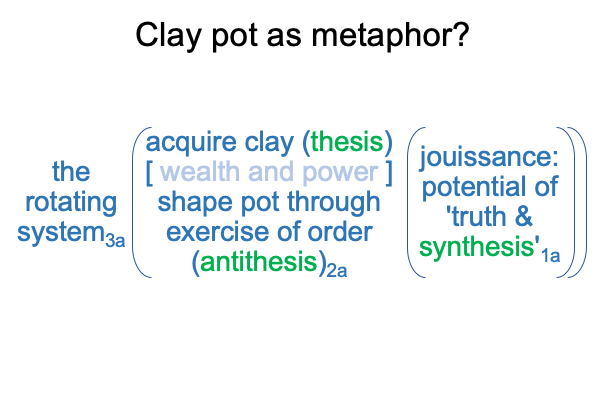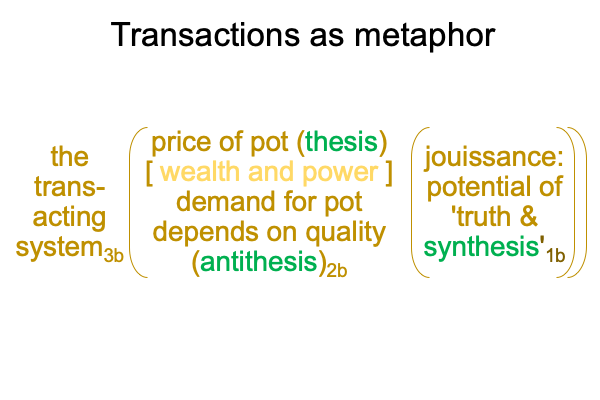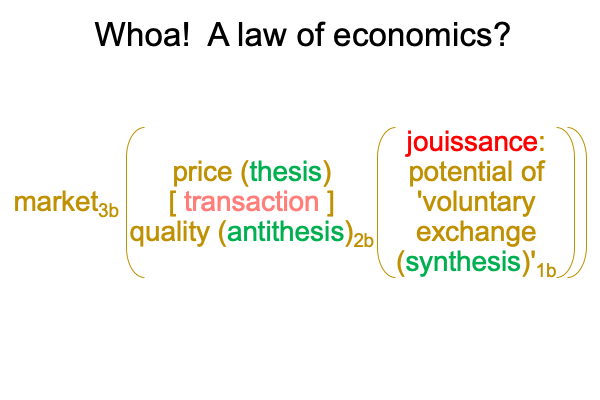0120 Consider the clay pot in which I brew my tea.
Yes, this clay pot was thrown on a potter’s wheel.

Does this serve as a metaphor for Zizek’s configuration?
The normal context of the rotating system of a potter’s wheel3a brings the actuality of {the acquisition of clay [wealth and power] shaping of pot as an imposition of order}2a into relation with the potential of ‘truth and synthesis’1a, that is, jouissance3a.
0121 Why the subscript “a” instead of “c”?
The subscript “a” denotes firstness, with respect to level. The above category-based nested form belongs to the content level. In contrast, the subscript “c” denotes thirdness, with respect to level. Zizek’s configuration belongs to the perspective level.
0122 So, I ask, “Does the petit objet a of [wealth and power] accrue to the content level, in this instance?”
Well, wealth can go with knowing how to acquire the clay and shape a pot on a potter’s wheel. So can power. But, this [wealth and power] is a mundane, imaginary attractor, compared to the celestial, symbolic lure of [wealth and power] on the perspective level.
0123 Yet, a Buddhist may respond, “This illusion of wealth and power actually offers an imaginary lure. Consider the one who throws a pot with the intention… the fixation… that the pot is not for making tea, but to be sold at a certain price. Then, does your petit objet a of [wealth and power] accrue to the levelb that situates the throwing of the clay2a?”
0124 That is a very good response, here is the situation level, where a transaction occurs.

0125 The normal context of a transacting system3b, such as a bazaar3b, brings the dyadic actuality of {the price of a thrown clay pot [wealth and power] the demand for the manufactured pot}2b into relation with the potential of ‘truth and synthesis’1b, that is, situation-level jouissance1b.
The price of the pot2b goes with acquisition. The price2b is like a thesis. Whether there is any demand at a certain price associates to an exercise of order2b. Indeed, in English, the term, “to place an order” signifies a demand and constitutes a transaction. The order2b depends on whether the quality2b of the product is worth the price2b.
To me, that means that the situation-level petit objet a2b, [wealth and power]2b, has become [transaction]2b.
0126 Is that an illusion?
If it is, then this illusion stands as one of the foundational laws of economics.

0127 So it does, says the Buddhist economist.
The normal context of a market3b brings the actuality of the dyad2b, {price [transaction] quality}2b, into relation with the potential of ‘voluntary exchange’1b.
However, price2b and quality2b, the objet a, are illusive qualities that delusional Western economists turn into variables for their nonsensical equations.
Plus, the market3b and the jouissance of voluntary exchange1b are self-reinforcing constructs that lead to suffering.
0128 Did I pay too much for this pot in which I am brewing my tea?
Yes, I am stewing about that.
Perhaps, I need to let it go.
